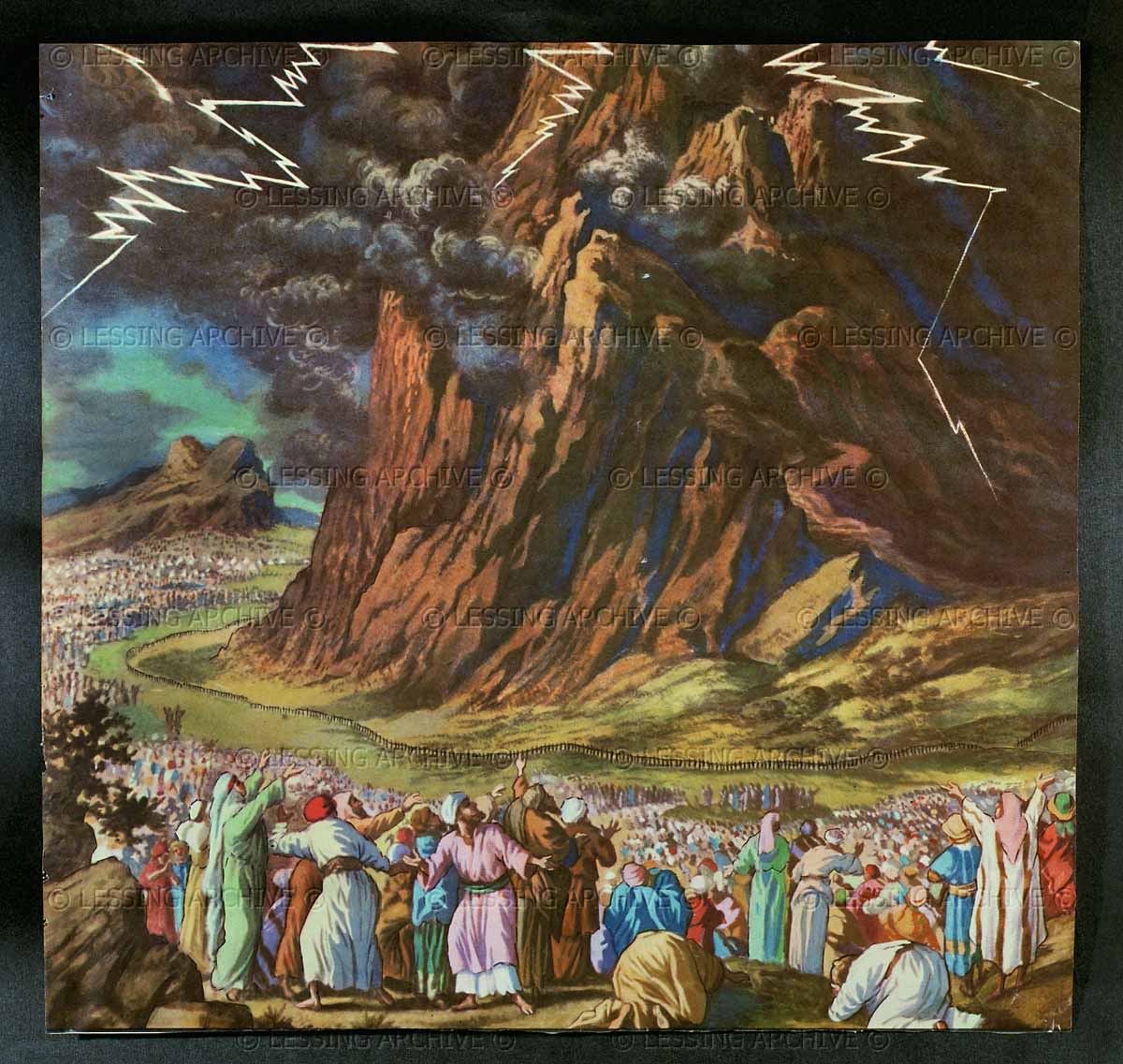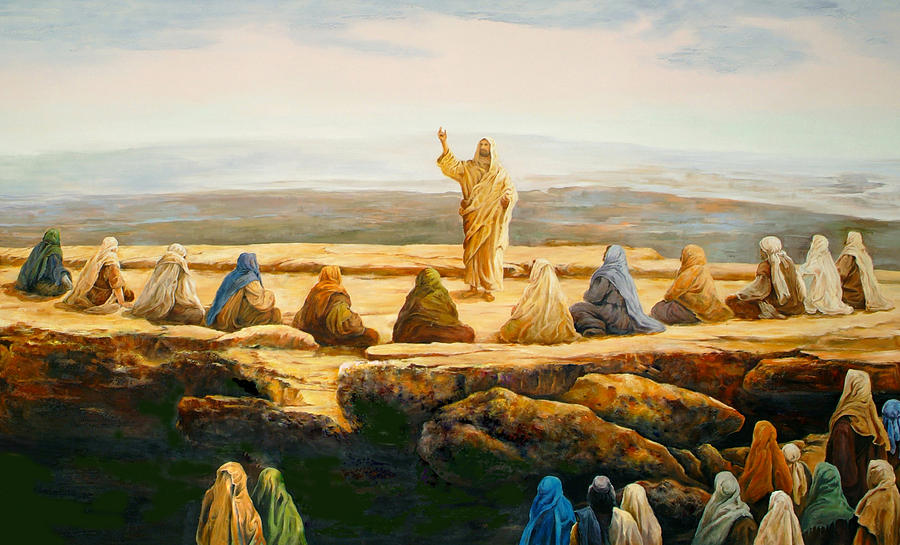[First posted in 2012. Heard enough “sermons” every Sunday at church? Here’s more—-a ‘Sinai6000 sermon,’ re-examining the original Revelation on Sinai by YHWH and the Gospel revision by the “God” we, as former Messianics, called “Yeshua YHWH”. Torah translation is from Everett Fox’s The Five Books of Moses.—Admin1]
———————————–
Quite a provocative title for a controversial discourse! Actually it should be retitled “The Revelation on Sinai vs. The Sermon on the Mount,” because there is a vast difference between a ‘revelation’ and a ‘sermon’.
Anyone can preach a ‘sermon’ — a ‘churchy’ word, loose dictionary definition:
—a talk on a religious or moral subject,
especially one given during a church service
and based on a passage from the Bible.
However, only God can issue ‘divine revelation’, reveal Himself and His Will initially to Israel, though intended for all humankind.
But why “vs.” and not “vis-a-vis”? Are the two not compatible in message and speaker?
Here’s a logical deduction from a long-time study of the New Testament:
What was originally given on Sinai to the Israelites by YHWH, [supposedly the “Father” in the NT Trinitarian version of God]
- is supplanted by the teachings of Jesus [supposedly the “Son” in the Trinitarian version of God]
- who delivers the final word or re-interpretation of that Sinai revelation;
- hence the necessity to produce a sequel to the “Old” Testament
- to set the record straight on all these “new” teachings
- in a “New” Testament,
- because the “Old” is . . . well . . . old, as in “obsolete”, as in not applicable to “new” testament believers and the “new” Israel.
If the 12 tribes of Israel did not get it the first time around, the 12 apostles were expected to get it the second time around.
The Trinitarian Godhead must have thought it best to retell the Torah through their 2nd Person, the active one who could assume human flesh and not appear so fearsome because he really managed to look just like one of us. Admirably, he didn’t choose the shortcut by suddenly appearing as a full-grown human which he could have easily done; rather, he opted for the longer route of being born as a helpless infant and growing up unknown until he appeared as an adult to finally carry out the divine plan. Evidently, he really wanted to experience what it was like to be ‘human’!
The early church fathers would debate on how he did this—
- a divine sperm from the Holy Spirit fertilized an egg of a female virgin, one with no original sin;
- or simply implant into a virgin’s womb the completed divine fertilized egg-sperm.
No matter how, what’s important is God is dwelling among men, “Emmanuel”, God with us. This time he appears as a man, not as a ‘burning bush’ or a ‘pillar of fire by night’ and ‘Shekinah glory cloud by day’, or an invisible presence in the Ark of the Covenant.
What a brilliant disguise for the Son-God indeed, so convincingly a man, that nobody mistook him at all for YHWH. The Trinity had to change tactics from the first revelation on the desert mount. Why? Because Israel’s history showed their failure to carry out their divinely-ordained assignment, but that requires another article so let’s just focus on a simpler answer.
Recall that in the book of Exodus, the Israelites could hardly bear to listen to the thundering voice of YHWH from Mount Sinai, so that they prevailed upon Moses to spare them and just act as their mediator:
16 They said to Moshe:
17 Moshe said to the people:
So according to the New Testament storyline, a few millennia later, YHWH metamorphosed into a man named Jesus who executes ‘plan B’ at the appointed time, first by teaching and preaching in Galilee and Judea. Multitudes followed him around. His inner circle of apostles assisted him, listened to his parables, witnessed his miracles, marveled at his interaction with demonic spirits. If a group of people could have memorized his teachings and more importantly, understood them, it would have been the 12.
Unfortunately and with much disappointment, it appears few [if any] really understood the ‘good news’ during the Son’s teaching ministry, for how could anyone understand that spiritual victory could result from the Son-God’s physical death? It’s mind-boggling and difficult to process even to this day.
Not until Pentecost did they begin to understand, but only when the Holy Spirit appeared as the final installment in the presentation of the Trinitarian Godhead. After that eureka experience and what is called the outpouring of the Holy Spirit, God could enter everybody’s heart—well, not everybody—only those who believe in the Christian gospel and receive Jesus as Lord and Savior. The Holy Spirit is said to open up one’s understanding of the Scriptures so that without his indwelling presence, we can NEVER understand the Bible. If so, then we—Sinaites–are now perceived as not understanding the New Testament because we’re no longer believers in Jesus as God; we’ve lost the Spirit, and therefore are without spiritual illumination and are as blind as the Jews who never accepted Jesus as God, just as Paul alleged in his book titled Romans.
But is that what is declared in the Tanach/TNK?
The One and Only God YHWH is so much simpler to understand: basically He says —
- here are the do’s and don’ts,
- you can do it and be blessed and be a blessing to others!
- If you don’t, there are consequences,
- for you
- and unfortunately, for others you affect adversely.
[EF] Deuteronomy 30:11-14
11 For the commandment that I command you this day:
it is not too extraordinary for you,
it is not too far away!
12 It is not in the heavens,
(for you) to say:
Who will go up for us to the heavens and get it for us
and have us hear it, that we may observe it?
13 And it is not across the sea,
(for you) to say:
Who will cross for us, across the sea, and get it for us
and have us hear it, that we may observe it?
14 Rather, near to you is the word, exceedingly,
in your mouth and in your heart, to observe it!
Now to the Sermon on the Mount.
Supposedly the same sermon or a version of it also appears in Luke, a sermon delivered on the plain. Bible interpreters think it’s the same sermon, except that the multitudes were seated on the mountain slope while Jesus preached on the plain instead of the other way around. Also, they say that the Sermon which is the longest piece of teaching from Jesus simply summarizes his best-known teachings. Whatever . . . let’s not get lost in technicalities.
The Sinai revelation gave many details; out of the total 613 commandments [as of first and only count by a Jewish Torah scholar], we can focus on the 10 which is universally known and in which the essence of God’s will is clearly stated:
- Love God above all
- and love thy neighbor.
Jesus reiterated the shortened version.
To his credit, he also taught the first four commandments well — he always acceded to the Father;
- he told Satan
For it is written,
‘You shall worship the LORD your God
and Him only you shall serve.’
- He taught his disciples to address their prayers to the Father, and not to himself.
- He understood the ‘weightier matters of the law’, giving samples like meeting another person in dire need is more urgent even if it conflicts with Sabbath observance.
- He was right in declaring that not one iota of the Torah will be changed because that was declared as early as the end of the 40 years wandering in the wilderness, just before the Israelites enter the promised land.
[EF] Deuteronomy 4:2:
1 And now, O Israel, hearken to the laws and the regulations
that I am teaching you to observe,
in order that you may live
and enter and take-possession of the land that YHWH, the God of your fathers, is giving to you.
2 You are not to add to the word that I am commanding you,
and you are not to subtract from it,
in keeping the commandments of YHWH your God that I am commanding you.
Was Jesus guilty of “adding” to God’s word?
Well . . . if these were really his words, then what do you think? You have heard it said . . . . but I say unto you . . . When there’s a “but” what does it mean? That there is some revision to the original? So let’s look at 3 samples of those revisions in Matthew.
Men have struggled with Jesus’ stricter re-interpretation.
- In the case of adultery, for instance, temptation is all around, especially these days when all states of undress among the female population are difficult to avoid looking at. And yet Jesus said “if you as much as look . . .” you’re already in sin.
- Go back to what Adonai Elohim told Cain in Genesis —sin is crouching at your door but you can overcome it. We have impulses that are part of being human, male, female —if they are prohibited, then we do not have to act on them! It is when we act on them that we sin. Granting, thoughts and feelings that should not be there could lead to the next level if we entertain them, but until we give in to them, we have not sinned!
- Being angry is part of our lives — certain things, situations and people exasperate us. We bear grudges and act badly toward others, that is not good for us nor the others. Anger could lead to rage and on to inflicting harm on the object of our anger, but until we commit that murder, we have not sinned. Anger has to be curbed, of course.
- As for “love your neighbor” and “hate your enemy”, notice that our color coding is an indicator of source: OT and NT. Why have we left “hate your enemy” in red? Because the Hebrew Scriptures which is supposedly the foundation of the re-titled Christian version “Old Testament” has this to say about neighbor:
Leviticus 19
Ritual and Moral Holiness
The Lord spoke to Moses, saying:
Speak to all the congregation of the people of Israel and say to them: You shall be holy, for I the Lord your God am holy. . . .
You shall not render an unjust judgement; you shall not be partial to the poor or defer to the great: with justice you shall judge your neighbour. You shall not go around as a slanderer among your people, and you shall not profit by the blood of your neighbour: I am the Lord.
You shall not hate in your heart anyone of your kin; you shall reprove your neighbour, or you will incur guilt yourself. You shall not take vengeance or bear a grudge against any of your people, but you shall love your neighbour as yourself: I am the Lord.
- The New Testament has many good things to teach—such as do not let the sun go down on your anger but that is not just in the new, it originated in Tanach, from the God who taught His chosen people how to act kindly and mercifully toward one another. As early as Cain and Abel, the answer is YES to Cain’s “Am I my brother’s keeper?” And that encapsulates much of Torah teaching about horizontal relationships.
- As for turning the other cheek when someone slaps you, what does that accomplish? We are to stand up against abusers, not encourage them to further abuse us! Such destructive character traits will not be curbed with passive response. Abusive husbands never change when battered wives keep offering the other cheek! At some point, the violence escalates and wives and their children eventually have to flee for their lives.
It is puzzling that while Jesus requires a higher standard in the observance of the commandments, Paul negates the commandments altogether with his teaching that under the new covenant, we are under “grace” and not “law.” There is more to this than can be discussed here, so we will reserve those discussions for “According to Paul . . .#2.”
NSB@S6K





Reader Comments